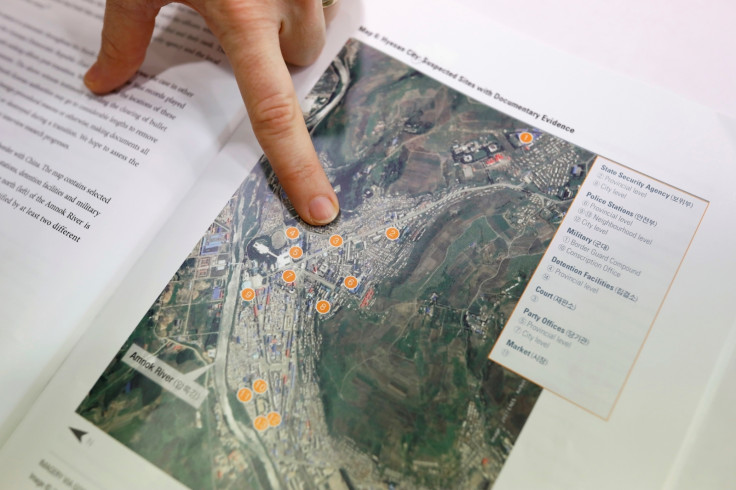North Korea accused of publicly executing citizens: Why are they killed and where are they buried?
A Seoul-based NGO has identified sites of public execution and mass graves in North Korea.
The North Korean regime has allegedly been carrying out public executions of its citizens for seemingly minor crimes, such as theft of farm produce (corn and rice), or distribution of media from rival neighbour, South Korea.
The executions are reportedly carried out in prison camps to incite fear and intimidate those who plan to escape from. Executions also occur on river banks, at school grounds and at marketplaces.
The claims have been made in a report released on Wednesday (19 July) by a Seoul-based non-government organisation called the Transitional Justice Working Group (TJWG).
The report was based on interviews with 375 North Koreans who defected to Seoul in the past two years, Reuters cited TJWG as saying.
The group consists of human rights activists and researchers who are led by a former advocate for human rights in North Korea, Lee Younghwan.
Efforts to hold the three generation Kim regime accountable for decades of what the rights activists describe as crimes against humanity have so far amounted to little.
In order to substantiate those claims and to hold the regime responsible, the group has tried to document details that have not been reported so far, such as the location of public killings and mass burials.
"The maps and the accompanying testimonies create a picture of the scale of the abuses that have taken place over decades," the group said.
The group's research has been largely backed by the US-based National Endowment for Democracy, which is known to boost civil society and democratic institutions across the globe and receives funding from the US Congress.

'Mass graves' identified
The 375 North Korean defectors, whom the TJWG spoke to, were reportedly shown maps of their home towns and were asked to identify places where abuses occurred.
The North Koreans apparently "identified 47 possible 'body' sites, including cremation sites and crude burials in remote areas. These sites are often close to detention facilities and labour camps," the group said in a statement.
The group believes this might yield documentary evidence in the future.
"Some of these sites are thought to contain 10-15 bodies together. Our findings showed instances where over 4 dozen killing sites were independently identified as being within 4km of a suspected burial site," it added.
Sarah Son, one of the authors of the report said: "Location-based data provides a bigger picture on patterns of abuse within a country."
Most of the sites were reported to be in North Hamgyong province which shares a long border with China. It is this province that is believed to be the source of most defectors as the border river with China is relatively easy to cross on foot there.

However, the group did not disclose the exact location of the burial sites or where the potential documents are being stored in the isolated country. The group fears that the Kim Jong-un regime would try and destroy any evidence if it gets to know the sites are being identified and made public.
'Not worth a bullet'
Several North Koreans are reportedly executed even for crimes like stealing electric cables from factories. These crimes are reported to be most commonly administered by shooting, the TJWG said.
However, the defectors also pointed out that not all people were shot dead. Some were reportedly even beaten to death because "some crimes were considered not worth wasting bullets on".
The executions are also reportedly carried out against North Korean officials, on whom the "charges were described as including embezzlement, espionage, and procuring funds and/or goods for personal gain/enjoyment (luxury goods)," the TJWG said.
"When executions of officials take place, officials from other provinces and counties of similar rank can be summoned to watch the executions as a deterrence tactic," it added.
The defectors said they have witnessed public executions and rights abuses at detention facilities.
2014 UN commission report on North Korea 'torture'
The group said its project to map the locations of mass graves and executions was initiated in the wake of the landmark 2014 report by a United Nations Commission of Inquiry on Human Rights in North Korea.

The commission had alleged in its report about decades of brutality against the North Korean people, including hard labour in political prison camps, torture, forced abortions and infanticide, and brainwashing.
This had led to the global body pushing the UN Security Council back then to consider referring the hermit kingdom and its leadership to the International Criminal Court (ICC).
However, the efforts by the UN members did not result in Kim Jong-un being referred to the ICC because of China and Russia, who are Pyongyang's historic patrons, vetoed the move as they hold such powers at the UNSC.
However, North Korea had rejected the commission's report and denied all allegations.
"The commission of inquiry report was not the end, it was just the start," said Oh Se-hyek, another author of the report, who is also a North Korean defector. "We must continue that work."
© Copyright IBTimes 2025. All rights reserved.





















